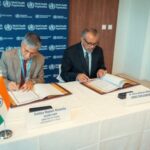As one deadly disease spreads throughout the world, immunization efforts must continue to prevent outbreaks of other diseases
As COVID-19 continues to spread around the world, people in all countries are being encouraged to take precautions to prevent transmission, including in many countries by staying at home and physical distancing. But a pandemic does not erase other diseases and their impact. While many services, including some health services, are being scaled back, the risk of further outbreaks of infectious diseases grows. The healthcare disruptions caused by COVID-19 could have a devastating impact on child mortality.
In 2020 80 million children under one year of age, live in a country that has reported some kind of disturbance to the immunization programme largely due to limited access to health centres, low availability of PPE for healthcare workers and fear of contracting COVID-19. WHO is helping countries as they balance the threat of COVID-19 with the threat of vaccine-preventable disease outbreaks and deaths that could result. With global and regional guidance, as well as by facilitating the delivery of essential health supplies, WHO is providing knowledge and assistance to immunization programmes worldwide, throughout a rapidly evolving situation.
Here are some examples of how countries are working to achieve or maintain high vaccination coverage in the midst of the global pandemic.

Italy, one of the countries hardest hit by COVID-19 was forced to repurpose much of its health-care personnel as COVID-19 cases mounted starting in late February 2020, However, wherever possible, the country’s regions and provinces maintained childhood immunization as part of the essential health services, prioritizing primary vaccine doses, while ensuring strict infection prevention and control measures, such as time slots and physical distancing in waiting rooms. The authorities also emphasized the importance of registering the children who had missed their routine doses and prioritizing them as soon as services were available again.
In Syria, WHO and UNICEF supported a 5-day national immunization campaign in June to close vaccination gaps among children. During the campaign, with infection, prevention and control measures in place, health workers vaccinated more than 210 100 children and reviewed the vaccination status of 900 000 children to determine the vaccines they still needed
Burkina Faso also conducted mass vaccinations in July, with a 4-day polio immunization campaign. Across two districts in the country’s Centre-East region, 174 304 were vaccinated against polio, in line with WHO guidelines and maintaining infection prevention and control measures.
Across 39 countries and territories in the Americas, with lockdown restrictions easing, vaccination services that had been suspended in some countries are resuming. Vaccination services increased from 57% normal functionality to 79% in the same period. This was facilitated by using innovative approaches like mobile vaccination centres, drive through vaccinations, and vaccinating at schools and directly in homes.
The risk of outbreaks of vaccine-preventable diseases continues as the pandemic grows in many areas around the world. In January 2020, as Cambodia confirmed its first COVID-19 case, it also confirmed 84 cases of measles. 341 measles cases were recorded in Cambodia in the first four months of 2020.
As COVID-19 has taken hold, it has been vital that immunization efforts against measles continue. As a result, mobile outreach teams have visited communities, giving catch-up vaccinations to children least likely to visit health centres and hospitals. In high-risk communities, health workers have gone door to door and boat to boat in order to administer lifesaving vaccines to the most vulnerable.
Due to the ongoing work of the outreach immunization programme, communities are familiar with health workers and have developed trust in them. This has led to the same health workers providing COVID-19 guidance directly to communities that may not understand the complexities of the virus and what is needed to stay safe.
After months of resilient work from outreach teams who safely continued immunization programmes during the pandemic, Cambodia saw fewer cases of measles recorded in May 2020 than in each of the previous months.
Amidst challenges to resuming immunization services, there is encouraging news from the Maldives and Sri Lanka. The two countries were verified as having eliminated rubella, a vaccine-preventable disease, in early July. They are now the first two countries in the WHO South-East Asia region to eliminate both rubella and measles before the 2023 target.
Countries across the South-East Asia region are making concerted efforts to resume disrupted immunization programmes with precautionary measures in place. National action plans on maintaining immunization services in the context of the COVID-19 transmission dynamics have been developed in all countries of the region.In Sri Lanka, health clinics have extended hours as one means to comply with physical distancing and have limited the number of children being served per hour. Health workers have been advised to vaccinate all children in a family needing vaccines in one visit if possible and to administer multiple catch-up vaccinations to each child according to vaccine-specific recommendations.


A mass vaccination campaign with measles-rubella vaccine in Nepal that was halted mid-way in April was resumed in June with infection prevention measures in place.
The world is in the midst of a pandemic. In continuing to administer vaccines whenever safely possible, countries are taking innovative steps to prevent a further burden on families and health systems that could be caused by outbreaks of vaccine-preventable diseases.
healthysoch







